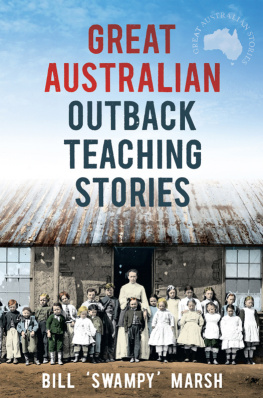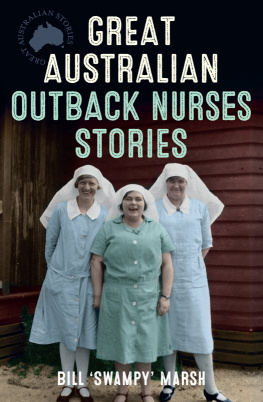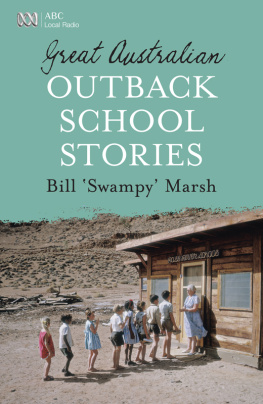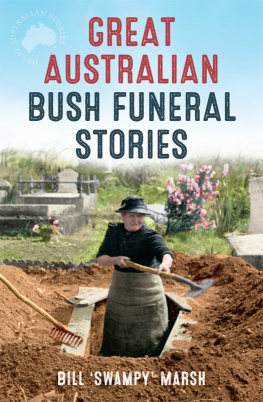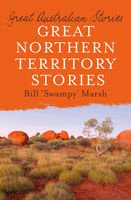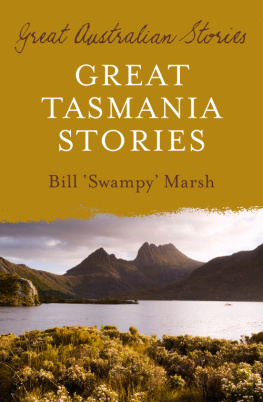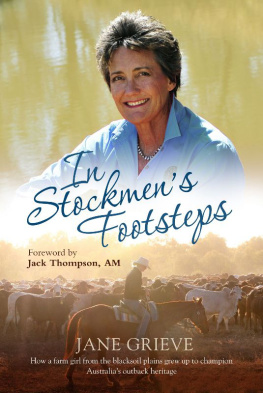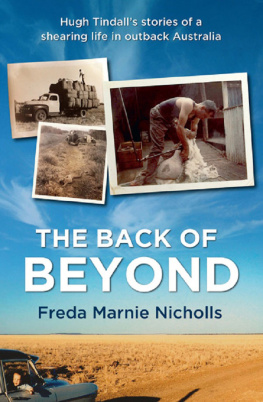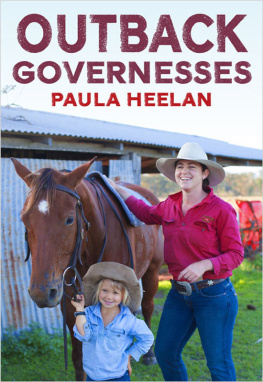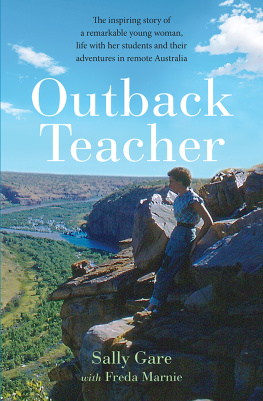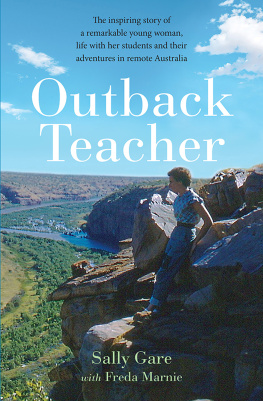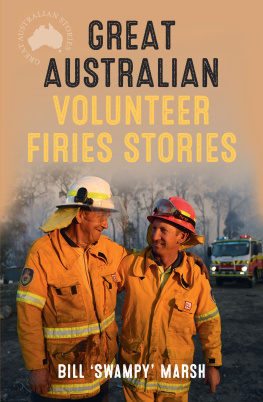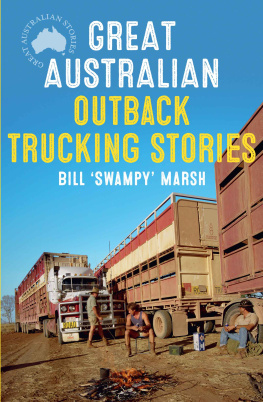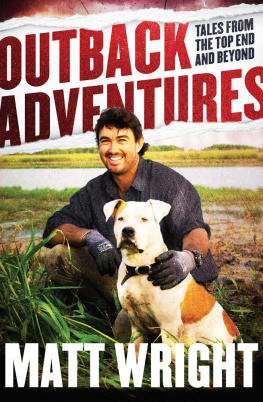Dedicated to Jack Goldie Goldsmith
a true friend and a great storyteller
19332015
Special thanks to senior publisher Brigitta Doyle, editor Rachel Dennis, along with the promotions staff at ABC Books HarperCollins Australia, without whose support these stories may never have seen the light of day; and to my precious support crew of Chris Collins, Kath Beauchamp, Craig Langley, Margaret Loveday and Margaret Worth.
The stories contained in this book are written from interviews recorded by Bill Swampy Marsh. The contributors are:
Bernard Arrantash
Kathleen Beauchamp
Fred van Brussel
Robyn & Keith Carpenter
Bill Cole
Graham & Val Cowell
Bob Daly
John Dihm
Madison Dowling
David Farquhar
Margaret Gibbons
Evelyn Glazbrook
Rob & Pat Greenhill
David & Christine Harris
John Howard
George A Lee
Kirsty McCarthy
Bev Mezzen
Lucy Parker
Frank Partington
Paul Roe
Jenny Scott
Peter Simpfendorfer
Colin & Joy Stacey
Les Sullivan
Brian & Mary Wake
... and many, many more
Tom Bateman
Paquita Boston
Ray Campbell
Chris Carter
Chris Collins
Nancy Cox
Les Davey
Barry Donaghy
Patricia Evans
Troy Gallagher
Lexy Giddings
Jack & Marina Goldsmith
John Hammond
Richard Hempel
Craig Langley
Margaret Loveday
Dan McIntosh
Jane Owens
Lindsay Parkhill
Bill Rawson
Cheryl Russ
Tim Shallcross
Frank Sontag
Russell Stokes
Ellen Trevorrow
During the research for this book my partner, Margaret Worth, and I went on a nine-thousand-kilometre, six-week trip from Adelaide, up to Broken Hill, Wilcannia, Bourke, Hungerford, Cunnamulla, Longreach, Winton, Normanton, Karumba, Mount Surprise, Mareeba, Port Douglas, Cairns, Ayr, Rockhampton, Brisbane, Alstonville, Nimbin, Taree, Gosford, Oberon, Darlington Point and back home across the Hay Plain. During that time I interviewed many, many people, not only for this book but for future books to come.
It was a very special trip through just about everything that this land could toss at us; through drought-stricken central-western Queensland, where we arrived in Winton just hours after the Waltzing Matilda Centre was burnt down. You really had to feel for those people. Down but not out; never. Then it was from the shortsn T-shirt weather of the Gulf Country to being rugged up while driving through snow storms, while we wended our way up to the central tablelands to the town of Oberon.
Along the way there were many, many highlights. There was being a guest on Broken Hills School of the Air, where the students were rehearsing a song I wrote Its a Miracle which theyve since performed at the Barrier Schools Choral Festival (you can see it on YouTube search for SOTA Choral Festival). We also managed a weekend visit to the lava tubes at Undara Volcanic National Park, west of Cairns. But for me, it was the people that I got to meet and interview that made the trip so special. Id like to thank those who looked after me and us during the journey. Their kindness, openness and hospitality is, and was, greatly appreciated.
We are a country, not only of amazing beauty but also of amazing people. Those that I interviewed may not be famous or even well known but they are the heart and soul that make this country tick.
I hope to see you out on the road, somewhere.
Definitely one of the highlights of my career was my time teaching in small towns throughout Western Australia. Many just one-teacher schools. Actually, at one place, there wasnt really a town at all, just a school building stuck out in the middle of a wheat paddock. But as the head and only teacher, teachers like us were responsible for the education of all those attending the seven primary grades, plus you may well have had to keep an eye on a couple of high school correspondence students as well.
Back then, not only did we have to teach the three Rs but you could also add on the tasks of sewing teacher, arts and craft teacher, music teacher, physical education teacher, manual teacher you name it. Plus there were the duties of gardener, cleaner, nurse, registrar, office lady, free milk dispenser, librarian and, on occasions, school bus driver. Oh, and in one particular school I was even responsible for mother craft. And being male and just nineteen, as I was at the time, you might imagine my surprise when a young girl asked me, Sir, whats the best milk for babies? No, it wasnt Sunshine milk or cows milk.
Taking all that into account, those men and it was really only male teachers back then they really provided a first-class education and, whats more, that education might well have been achieved in schools with no electricity and very little funding. Now, from my point of view, theres three reasons for those children receiving such an excellent education: firstly, the teachers in these small communities were, on the whole, naturally dedicated and motivated; secondly, they had special training in teachers college; thirdly, they were also men who wanted promotion. And in those days, the quickest way for promotion was to go through the one-teacher schools, then on to the two-teacher schools and so on, up the ladder.
In addition, we had a superintendent who visited the school for the express purpose of marking our efforts, and without a satisfactory mark there was no promotion. So it was necessary for you to put in the effort. As a result, students were not only given a sound grounding in the three Rs and other subjects but, because it was impossible for the teacher to constantly attend to each grade, the students had to learn to work on their own. Thus they became very independent, which is extremely important.
Then of course, in all the small places I taught at, there was an amazing sense of community. If anyone within that community was in trouble or whatever, everyone rallied around to help and that kindness and thoughtfulness was transferred to the children.
So there were many advantages in being educated in those smaller towns. And onto a more serious note, its my feeling that todays country children are the poorer because many of those towns fell into decline when the push came to close the smaller country schools and amalgamate them with the schools in the larger country towns. And once the school went, so did the town. Id even go so far as to say that the state of Western Australia and the country of Australia, as a whole, is the poorer for this fact.
Anyway, as I was saying, I taught in many one-teacher schools in Western Australia and the thing I was most amazed about was their great sense of community. A case in point was an experience I had while living in the township of Harrismith, in south-eastern Western Australia. It was a single-teacher school me. We didnt have piped water so there was no garden. There wouldve only been about twenty-six children in the school, ranging from Grade 1 through to Grade 7. With only four families living in the town, the balance of students came from the outlying farming area.
And it was the wonderful community of Harrismith that, when I suggested Id like to take a group of present and ex-students to far-off Canberra, was right behind me. It was to be a two-thousand-mile round trip. The neighbouring town of Tincurrin was also invited and the two communities joined together to raise funds for the trip.
Twenty-nine children between the ages of ten and seventeen were chosen to go. It was during the August/September holidays of 1967. My wife was the chaperone and I was the teacher. The cost for each student was the equivalent of seventy-five pounds and, for a group of farm kids who were preparing to travel all the way across the Nullarbor, there was all sorts of excitement and expectations. One that really stands out was Vicki. During packing, Vickis mum noticed that her daughter had put an empty jar into her case.

